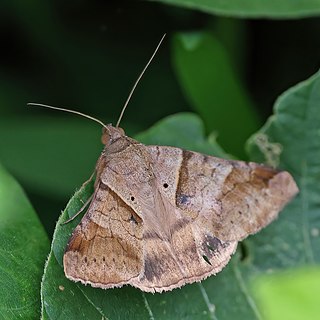
Mocis undata, the brown-striped semilooper, is a moth of the family Erebidae. The species was first described by Johan Christian Fabricius in 1775. It is found in the Afrotropical and Oriental regions, including India and Sri Lanka.
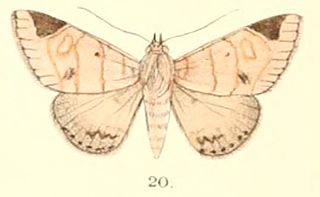
Dordura is a monotypic moth genus of the family Noctuidae erected by Frederic Moore in 1882. Its only species, Dordura aliena, was first described by Francis Walker in 1865. It is found in the Indian subregion, Sri Lanka, Myanmar, Thailand, Peninsular Malaysia, Sumatra, Borneo and New Guinea.

Hulodes caranea is a species of moth of the family Erebidae first described by Pieter Cramer in 1780. It is found from India, Sri Lanka, Myanmar, Java, Hong Kong to Queensland and New Guinea, it is also found on the Marianas and Carolines.

Pterocyclophora pictimargo is a moth of the family Noctuidae. It was first described by George Hampson in 1893 and it is found in Sri Lanka.

Thyas coronata is a species of moth of the family Erebidae first described by Johan Christian Fabricius in 1775. It is found from the Indo-Australian tropics of southern China, Taiwan, Japan, Nepal, India, Sri Lanka to Micronesia and the Society Islands.

Ercheia cyllaria is a species of moth of the family Erebidae first described by Pieter Cramer in 1779. It is found in the Indian subregion, Sri Lanka, Taiwan, Japan, Indochina, Thailand, Peninsular Malaysia, Sumatra, Borneo, Seram and the Kai Islands.
Ulotrichopus rama is a moth of the family Erebidae first described by Frederic Moore in 1885. It is found on Sumatra, Flores and Sri Lanka.

Acronicta pruinosa is a moth of the family Noctuidae. It is found in Sri Lanka, the Himalaya, east to Japan and Taiwan south to Myanmar and Peninsular Malaysia, Borneo, Java and New Guinea.
Diarsia ochracea is a moth of the family Noctuidae. It is found in Sri Lanka. It is found where tea is cultivated.
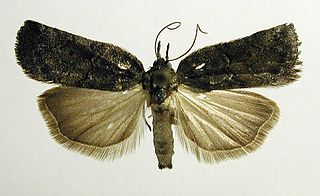
Nycteola revayana, the oak nycteoline, is a moth of the family Nolidae. The species was first described by Giovanni Antonio Scopoli in 1772. It is found from Europe and east across the Palearctic to Japan and India.

Ambulyx substrigilis, the dark-based gliding hawkmoth, is a species of moth of the family Sphingidae. It was described by John O. Westwood in 1847.

Ischyja manlia is a species of moth of the family Noctuidae first described by Pieter Cramer in 1776. It is found in the Indian subregion, Sri Lanka, Myanmar, Thailand, China, Okinawa, Sundaland, Sulawesi, Korea, the southern Moluccas, Australia (Queensland) and Palau.
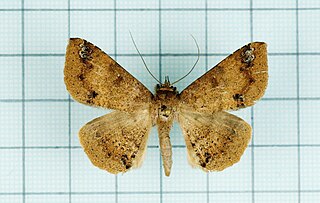
Ericeia inangulata, the sober tabby, is a moth in the family Erebidae. The species was first described by Achille Guenée in 1852. It is found in the Indo-Australian tropics of China, India, Sri Lanka, Myanmar, and the Marianas and Carolines, Fiji, Vanuatu, New Caledonia and Samoa.

Xylostola indistincta is a moth of the family Noctuidae first described by Frederic Moore in 1882. It is found from the Indo-Australian tropics of India, Sri Lanka to New Guinea.

Gesonia obeditalis is a species of moth of the family Noctuidae first described by Francis Walker in 1859. It is found from eastern Africa, the Seychelles, the Maldives and the Oriental tropics of India, Myanmar, Sri Lanka east to the Philippines, the Sula Islands and Australia. The adult moth has brown wings with a scalloped dark brown band near the margin. The hindwings are similar in pattern to the forewings but are a paler shade of brown.
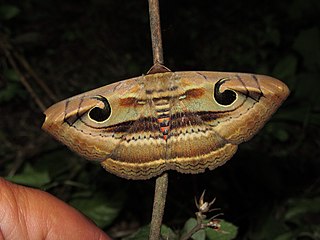
Spirama retorta, the Indian owlet-moth, is a moth of the family Erebidae. The species was first described by Carl Alexander Clerck in 1764. It is found in China, Korea, Japan (Honshu), India, Nepal, Bangladesh, Thailand, Cambodia, Myanmar, Vietnam, Taiwan, Sri Lanka, Malaysia, the Philippines (Luzon), Indonesia ,Japan.

Amyna punctum is a moth of the family Noctuidae first described by Johan Christian Fabricius in 1794. This moth can be found throughout subtropical African countries such as South Africa, Madagascar and Australasian countries like India, Sri Lanka, the Philippines, Borneo and the Andaman Islands.
Collix hypospilata is a moth in the family Geometridae. It was described by Achille Guenée in 1857. It is endemic to Sri Lanka.
Risoba obstructa is a species of moth of the family Nolidae first described by Frederic Moore in 1881.

Lacinipolia dimocki is a moth in the family Noctuidae. It is found on the eastern slope of the Washington Coast Ranges to southern California.














